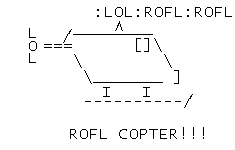Howdy, Stranger!
Categories
- 3.7K All Categories
- 3K The Midnight Age
- 757 Announce posts
- 125 Newbies
- 6 Class Guides
- 805 Harpy's Head Tavern
- 57 Echo Canyon
- 310 Self-Affirmations
- 163 Town Crier
- 135 The Exchange
- 167 Sparring Grounds
- Combat Guides
- 30 Combat Logs
- 188 Idea Box
- 9 Classleads
- 581 Roleplay Logs
- 107 Aetolia Development
- 5 The Void
- 744 Miscellaneous
- 9 Announcements
- 417 OOC Chat
- 217 Tech Talk
- 47 Scripts
Looking for more active discussion? Join our Discord at https://discord.gg/x2s7fY6
Fun Math Problems!
So guys, lately I've been spending a bit of time going through math problems and solving them. I personally have found it fun and think it'd be enjoyable to discuss solutions and such to the problems with others similarly inclined. Below is the link!
https://projecteuler.net/archives
https://projecteuler.net/archives

1


Comments
The main appeal of this is that it saves on the memory required by Eratosthenes' sieve. I also decided to begin the iteration at 3 and add in increments of 2, so as only to test odd numbers and further reduce the time spent on calculation. As each prime factor is found, the problem recurses, until it reaches a base case where a given number is the maximum prime factor, as determined by the square root test - this is then passed back upward to the top. I've tested it on smaller numbers as well as 600851475143, 67280421310721, and 67280421310719 - good results in all cases.
As solutions go, I'm proud of this one.
public static long getPrimeFactor(long n) { System.out.println("Initial Input: " + n); long test = n; /* We initialize the max as the number itself - if, in the loop below, we reach the bound without this value having changed, we know it's time to stop. */ long max = n; boolean stripped = false; if (test % 2 == 0) { System.out.println("Stripping out factors of 2."); } while (test % 2 == 0) { test /= 2; stripped = true; } if (stripped) { if (test == 1) { max = 2; } else { max = test; } System.out.println("Value stripped down to " + test); } /* The square root is important for cases in which this function actually does handle a prime. Why? Because the square root is the cutoff at which we must have found a multiple by now, and it's conveniently a mere fraction of the larger number. If our maximum (see below) remains the number itself, we're not going to find anything above the square root that will cleanly divide out of it. */ long bound = (long)Math.sqrt(test); System.out.println("Bound: " + bound); /* The bound is offset by one to account for rounding issues that might have resulted from the cast above. Math.sqrt returns a double - we need a whole number. */ for (long i = 3; i <= bound + 1; i += 2) { if (test % i == 0) { test /= i; System.out.println("Divisor Found: " + i + " divides out for " + test); System.out.println("\nRecursing Once More"); max = getPrimeFactor(test); break; } if (test < i) { System.out.println("Breaking - testing number now under iterative value; highest factor found. Passing " + max + " to higher function.\n"); return max; } if (i >= bound && max == n) { System.out.println("Breaking - bound reached; highest factor found. Passing " + max + " to higher function.\n"); return max; } } return max; }(2^4)*(3^2)*5*7*11*13*17*19 = 232792560